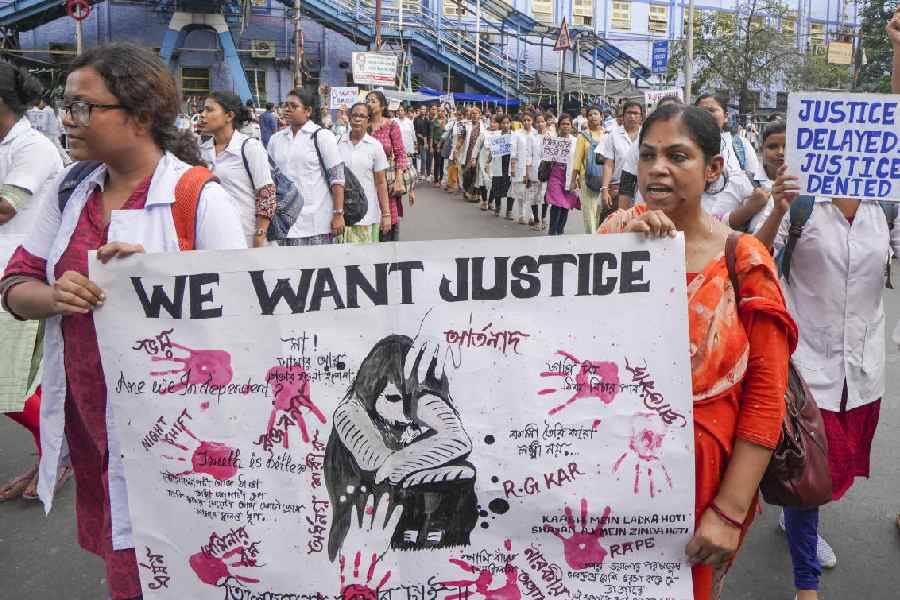A report in this paper (The Telegraph, Wednesday, August 24) was heartening. School heads had spoken up about how violent protests were disrupting classes. The spontaneous movement to demand justice has now degenerated into an ugly attempt by political parties to fish in muddy waters. It is becoming increasingly difficult to run an institution in the city.
The women’s march named ‘Reclaim the Night’ that took place on Independence Day eve, was powerful and had a frightening beauty. I was reminded of the demon slayer goddess Durga, Mahishashur Mardini. Surely it was symbolic?
And then all hell broke loose. The attack on the hospital past midnight fuelled public anger against the powers that be for not being able to control the vandals. Things began to get out of hand.
As days passed, the ‘apolitical’ protesters were hardly apolitical any longer. Many wished to be perceived as ‘doing something’ to show solidarity. I hear that schools were calling up papers to request them to ‘cover’ their activism. Middle school children were taking selfies and laughing and giggling, thrilled to be allowed on the streets with adults.
Young people must be sensitised first. Sex education as we know it, is not adequate for the exceptional situation we are facing today. Several complex strands are involved. Our children — age no bar — are being exposed to all kinds of sex-loaded images, videos of rapes, graphic details of the way the young doctor was violated. They need to be educated in an appropriate way instead of sending them out on the streets with half-baked information and a distorted understanding of what they are protesting about. New leaders are springing up and new groups are mushrooming almost on a daily basis, each flaunting its ‘creative’ way of protesting. Students ask one another, “What is your school doing for this cause?” Immediately they start developing a sense of inadequacy. “My school hasn’t organised a rally”, “let’s do something ourselves!” they say.
Boys feel embarrassed and guilty — nobody wants to know their stories of being violated; members of their gender are perceived as the predators.
I know that already people are getting tired of the protests. The plot of the story has taken a strange turn: the focus has shifted from the victim to the ex-principal of RG Kar Medical College and now the state government.
Social media is filled with all kinds of speculation, allegations and widespread vindictive rumours. Language is used in the most vulgar and malicious manner. Our young people are not learning to respect the chair or their own dignity. They must be educated to criticise policy, actions taken or not taken, important concerns that have been neglected instead of making vicious personal attacks.
Since we are so fond of protests and movements, why can’t we have one against bandhs?
Incidentally, people were shocked when they heard that we had kept our school closed last Wednesday as we have always proclaimed that we will never ever support a bandh. Far from being productive, it results in disruption of civic life. It leads to enormous losses in terms of money and time.
We, like some other schools, felt that our children must be protected from violence. Earlier, people could trust the government to tackle the situation competently. The other parties’ feeble attempts to make their respective bandhs successful would be firmly and effectively handled. The bandh culture gradually faded away. This time the school had to be closed simply because we didn’t want our children to be exposed to any risks, especially after the tumultuous incidents the evening before. And people thought that we had suddenly become bandh supporters. In addition to the possibility of physical danger, we certainly did not wish to expose our students to the kind of nauseating language that people have been using. Bhadra is a term that we are in the process of forgetting.
Our schools must educate their students to grow up to be strong women and men. They must be able to express their views in appropriate language, learn to protest effectively and in an informed manner. Their voices will be heard only if they argue sensibly and forcefully. They must take out rallies without affecting civic life. The politics of violence and counter-violence serves no purpose.
As for governance — the less we expect from the political parties of different hues, the better for ordinary citizens.
Author is director, Modern High School for Girls and Modern High School International










